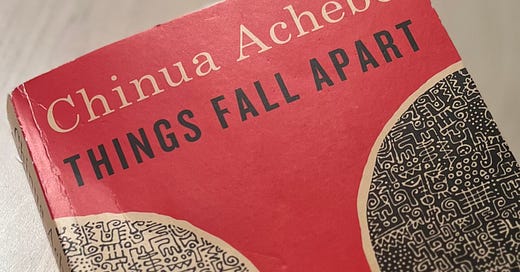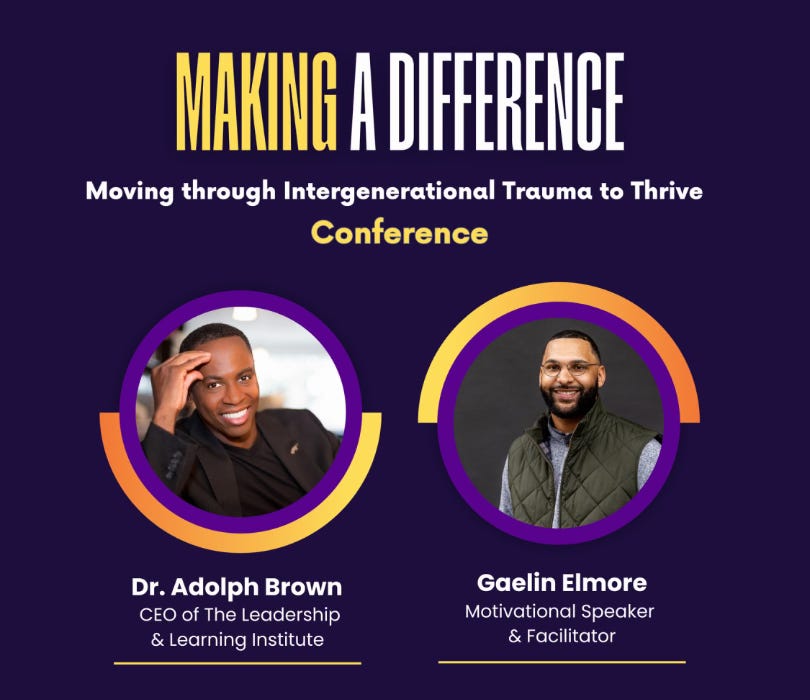Things Fall Apart: The Opioid Crisis and Its Impact on Special Education
Reading W.B. Yeats, Chinua Achebe, and a new Substack by Zachary Siegel
Hello, all. First, apologies for dropping off my quasi-regular Substack publishing schedule. My writing has been going full tilt in all different directions but here. I have been trying to finish work for my MFA class and editing poems for submission to literary journals. (And it looks like one of my poems is a finalist in the latest Catholic Literary Arts contest. I will be reading my poem this Tuesday evening at 7pm CST follow the link to register.)
However, much of my attention this week has been for my special education advocacy work. I recently completed my training to be a Special Education Surrogate Parent (SESP) through the Federation for Children with Special Needs (also known as FCSN, or simply “the Federation”). As defined by the Department of Education, the SESP role was “created to assign individuals to stand in the place of parents for the purpose of making special education decisions for children in the custody of the Department of Children and Families (DCF), and for children whose parents cannot be identified or located.” These positions are filled with trained, unpaid volunteers.
I have been attending a weeklong, mostly virtual conference for current and prospective SESPs called Making a Difference. Much of the event focuses on trauma informed education, working with state agencies and school districts, and the legal issues involved in these difficult cases. The conference started last week and the last full day of event is this coming Tuesday.
On Friday night I went to Cambridge for an in-person mixer. It was an opportunity to learn from longtime volunteers as to how things have changed over the years. There are conversations you simply cannot have other than but face-to-face.
There are children in DCF custody who are in hospital rooms because there are severe shortages of foster homes, group houses, or other suitable placements. Even if there are physical spaces, there is often not enough staffing to make them safe. The children who are temporarily placed in hospitals do not have access to an appropriate education. Severe depression, anxiety, and aggressive behaviors are common problems due to their isolation.
While participating in my pro bono hours with families, I started to have questions as to whether there was a correlation between the opioid crisis and an increase of negative special education situations. Not wanting to rely on anecdotal evidence, I did more research and I found this report by the Brookings Institution: The opioid crisis and community-level spillovers onto children’s education.
Children, of course, are not immune to the effects of what may happen in their homes and communities, and there is ample evidence that negative home or community factors can be associated with lost learning opportunities. One example is that children exposed to higher levels of neighborhood violence have worse education outcomes than children who are less exposed. In a similar vein, childhood exposure to the ravages of the opioid epidemic may result in worse education outcomes.
“The opioid epidemic is a widespread societal problem, and we are only starting to understand the far-reaching consequences that will be borne by individuals and communities.”
Education can be a pathway to economic and social mobility, especially for children from disadvantaged backgrounds. The collateral consequences associated with the opioid epidemic—family members who suffer from substance-use disorder, parents lost to opioid overdose, diverted community resources, and the fraying of neighborhood social connections—have the potential to negatively impact the educational outcomes of children.
The document by Brookings seems to be a first look at the link between the opioid epidemic and the educational outcomes of children, but more research needs to be done.
When trying to understand how we came to this destabilizing place someone referred me to Zach Siegel, a Chicago journalist whose writing delves into drug policy and public health issues.
When a problem becomes catastrophic it is easy to write simple narratives. A person became an addict because they were weak in character, evil in morality, or short-sighted in rationality. However, we got to this terrible point because organizations looked toward the financial bottom line, with little to no thought to the negative long-term consequences.
When describing the opioid epidemic Siegel infuses compassion into his writing. One of the examples that he cites is of a person who was prescribed two OxyContin, 50 milligrams a day at the age of 14. This was the beginning of this person’s addiction. Many of the cases began like this: with legal prescriptions.
Of course everything was made worse by the COVID pandemic—the negative effects of which are being revealed to us through lagging test scores, increasing rates of depression and anxiety, and other data.
Education of the young is a primary main concern of a modern society. An individual’s ability to read affects their power to advocate for their health and the welfare of those they love, to gain meaningful employment, to vote, and to learn and transmit valuable knowledge. School is where many people learn how to interact with all different levels of society: authorities, peers, and those who are more vulnerable than they are. There is a reason a Free and Appropriate Public Education a considered a right in this country.
What happens when a catastrophic event irrevocably changes a culture, a society, and history at large?
I am reading Chinua Achebe’s Things Fall Apart for the third or fourth time. I was introduced to it in a college class when I was 18, and now I am reading it more than four decades later with the
podcast.The novel’s title comes from the poem by William Butler Yeats.
The Second Coming (1919)
Turning and turning in the widening gyre
The falcon cannot hear the falconer;
Things fall apart; the centre cannot hold;
Mere anarchy is loosed upon the world,
The blood-dimmed tide is loosed, and everywhere
The ceremony of innocence is drowned;
The best lack all conviction, while the worst
Are full of passionate intensity.Surely some revelation is at hand;
Surely the Second Coming is at hand.
The Second Coming! Hardly are those words out
When a vast image out of Spiritus Mundi
Troubles my sight: somewhere in sands of the desert
A shape with lion body and the head of a man,
A gaze blank and pitiless as the sun,
Is moving its slow thighs, while all about it
Reel shadows of the indignant desert birds.
The darkness drops again; but now I know
That twenty centuries of stony sleep
Were vexed to nightmare by a rocking cradle,
And what rough beast, its hour come round at last,
Slouches towards Bethlehem to be born?
Great conflagrations can destroy the world as we know it. The carnage of the Great War and the flu pandemic which almost killed his wife likely inspired Yeats to write the apocalyptic vision in The Second Coming. The mere anarchy loosed upon the world in Things Fall Apart was the colonization of Africa by white men and the subsequent conversion of many Africans to Christianity. It is impossible for me to read these two works and not draw an analogy to our own point in history.
We have suffered two disasters: COVID and the opioid crisis. Although our time of extreme COVID isolation is over, the opioid epidemic is still with us. In 2022 fentanyl was responsible for 200 deaths every day. Over a quarter of a million Americans have died from a fentanyl overdose since 2018.1 I have met grandparents who are raising their grandchildren because their own children are currently suffering from or have died from their addictions. Some of these young children are entering middle school not knowing how to read, unable to write their own last names. Many of these children do not have diagnoses, which are necessary for schools to give them services.
But at least these are children who are in family homes. SESPs work with children who don’t even have that.
“The opioid epidemic is a widespread societal problem, and we are only starting to understand the far-reaching consequences that will be borne by individuals and communities.”
200 deaths from fentanyl every day in America
Things are falling apart, and the center cannot hold. Everywhere the ceremony of innocence is drowned.
Yet on Friday night I was in a room full of people who have worked countless hours to help the most vulnerable of children — for free — because it is the right thing to do and is desperately needed. Every child deserves to be seen and cared for.
Today our family celebrates the start of Advent. Carved into the our wooden wreath are the words: Hope, Peace, Joy, and Love. Whatever rough beast slouches toward Bethlehem must be met with the light of these words.
Advent is always about the child whose dignity we are called honor.
And it is by this work that we are all saved.
https://usafacts.org/articles/are-fentanyl-overdose-deaths-rising-in-the-us/#:~:text=In%202022%2C%2073%2C654%20people%20died,%2Dyear%20growth%20at%204.3%25.








First I have to say that 50 mg oxycontin a day for a 14 yr old is malpractice! Yes the mess we are in is a result of selfish greed. I am in awe and hold in prayer those that are called to stand in the gap for the innocents. Your dedication, commitment, and passion are inspiring! Congratulations on your poetry recognition for the Catholic literary arts.